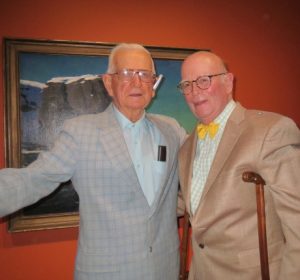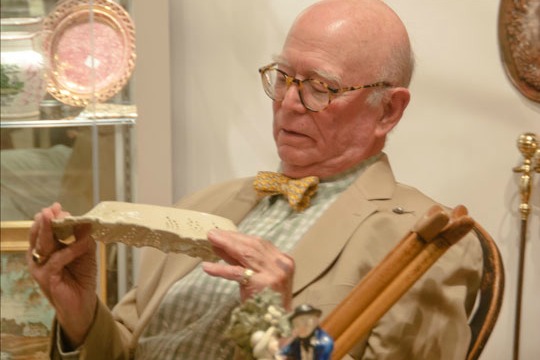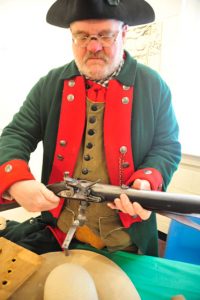The death of George A. "Frolic" Weymouth, an environmental pioneer, a co-founder of the Brandywine Conservancy, an accomplished artist, a passionate horseman and all-around community advocate, has rocked the region – and far beyond.

During the past decade, Weymouth battled a host of medical woes that required him to add a pacemaker, crutches, even an oxygen tank, but his indefatigable spirit overcame them with good humor. Officials at the Brandywine Conservancy and Museum of Art said Weymouth died the morning of Sunday, April 24, at the age of 79, surrounded by his family and loved ones.
“He was a great man who made this world a better and more beautiful place,” said Virginia A. Logan, executive director of the Brandywine Conservancy & Museum of Art. “He did everything with such elegance and thought, including preparing for the leadership transition at Brandywine.”
Victoria Wyeth, the granddaughter of Betsy and Andrew Wyeth, one of Weymouth’s closest friends, expressed sincere condolences to all the members of the Weymouth family.
“Frolic Weymouth was larger than life in so many ways and will be greatly missed by the entire Wyeth family,” said Victoria Wyeth. “What he has done to preserve the land and art of the Brandywine Valley is indescribable. On a personal note, I will miss his smile and his wonderfully colored turtlenecks.”
A direct descendent of the du Ponts on his mother’s side, Weymouth also had strong bonds with the Wyeth family. He was married to artist Anna Brelsford McCoy, Andrew Wyeth’s niece, until their divorce in 1979, and Jamie Wyeth, Andrew Wyeth’s son, married Weymouth’s cousin Phyllis.
It was Andrew Wyeth who encouraged Weymouth, also an acclaimed artist, to pursue egg tempera, a technique that produces painstaking detail by mixing egg yolk with pigment. Some of Weymouth’s best-known portraits included his grandfather Eugene du Pont Jr.; opera great Luciano Pavarotti; and Prince Philip, Queen Elizabeth's husband .
For several decades, Big Bend, Weymouth’s lushly landscaped 250-acre Chadds Ford estate, served as a venue for countless nonprofit fundraisers. Surrounded on three sides by the Brandywine Creek, it gets its name from being situated at a crook of the Brandywine. In 1969, Weymouth donated his property to the Brandywine Conservancy as its first conservation easement.
Nancy Mohr, an area preservationist, worked with Weymouth on the legendary acquisition of the King Ranch, a massive steer-raising operation. In 1984, the tract, which occupied a chunk of five townships, was threatened with development, and the Brandywine Conservancy and a residents’ group orchestrated the biggest privately funded land-conservation deal in the country. They bought 5,367 acres, protected it with conservation easements, and carved out a 771-acre preserve called The Laurels.

Mohr fondly recalled Weymouth’s penchant for being creative, romantic, and practical, all while maintaining a great sense of humor. He was “the dedicated engine that propelled the Brandywine Conservancy and the Brandywine River Museum to their nationally recognized achievements,” she said.
Gordon Woodrow, a retired entrepreneur who served as Sen. Arlen Specter’s chief of staff in the 1980s, said that he got to know Weymouth in the early days of the open-space movement – before the birth of the Brandywine Conservancy. He said he interacted with him professionally and sometimes socially.
“Chester County has lost one of its greatest friends,” said Woodrow. “Frolic was a 20th-century man who still appreciated the quiet elegance of the 19th century. He knew dukes, movie stars, captains of industry, governors, Presidents and rascals. Yet no matter who the person might be, when he spoke to you, you were the most important person in the room.”
Woodrow said that when others just worried about an issue, Weymouth grabbed paper and a pen and started to work until the problem was solved. “Then he would give everyone else the credit,” said Woodrow. “He loved his family, his friends, his county, and his country with a passion that was infectious.”
Weymouth, whose signature summer straw hat often shaded his contagious grin, once expressed consternation that the troubled economy made contributions to worthy charities more important than ever – as well as more challenging. He said that he had to restrain himself from yelling, "tightwad!" when people who could afford donations blamed the economy for not opening their wallets.
Weymouth often joked that he always knew that anyone who called him George didn’t know him very well. His carefree moniker originated after his older brother’s foxhound got lost, causing the tot to wail incessantly: "Where's Frolic? Where's Frolic?" Weymouth said his exasperated mother found a solution. "To shut him up, I was handed to my brother," Weymouth said. "It stuck."
Someone named after a dog might be expected to have a fondness for animals, and Weymouth certainly did. His menagerie at various times included horses, dogs, cats, parakeets, chickens, cows, and fish, and seeing Weymouth’s leading of the carriage event for Winterthur Museum’s Point-to-Point was a welcome annual ritual for area residents.
An equally positive sight: the 62,000 acres of scenic vistas protected under Weymouth’s watch as board chairman at the Brandywine Conservancy, a tenure that spanned nearly 50 years.
“Frolic was an environmental icon whose passion, creativity, and impact regarding the arena of land preservation and protection was surpassed only by his talent, enthusiasm, and accomplishments in the world of art,” said Bernard Sweeney, director of the Stroud Water Research Center. “His legacy regarding environmental stewardship is second to none.”
Many who knew Frolic echoed those sentiments on Sunday.
“We seldom have a chance to know someone who enjoyed the beauty of life, had so much, and gave back more, and we are all richer for his passing our way,” said Woodrow.
For obituary information, click here.



Comments